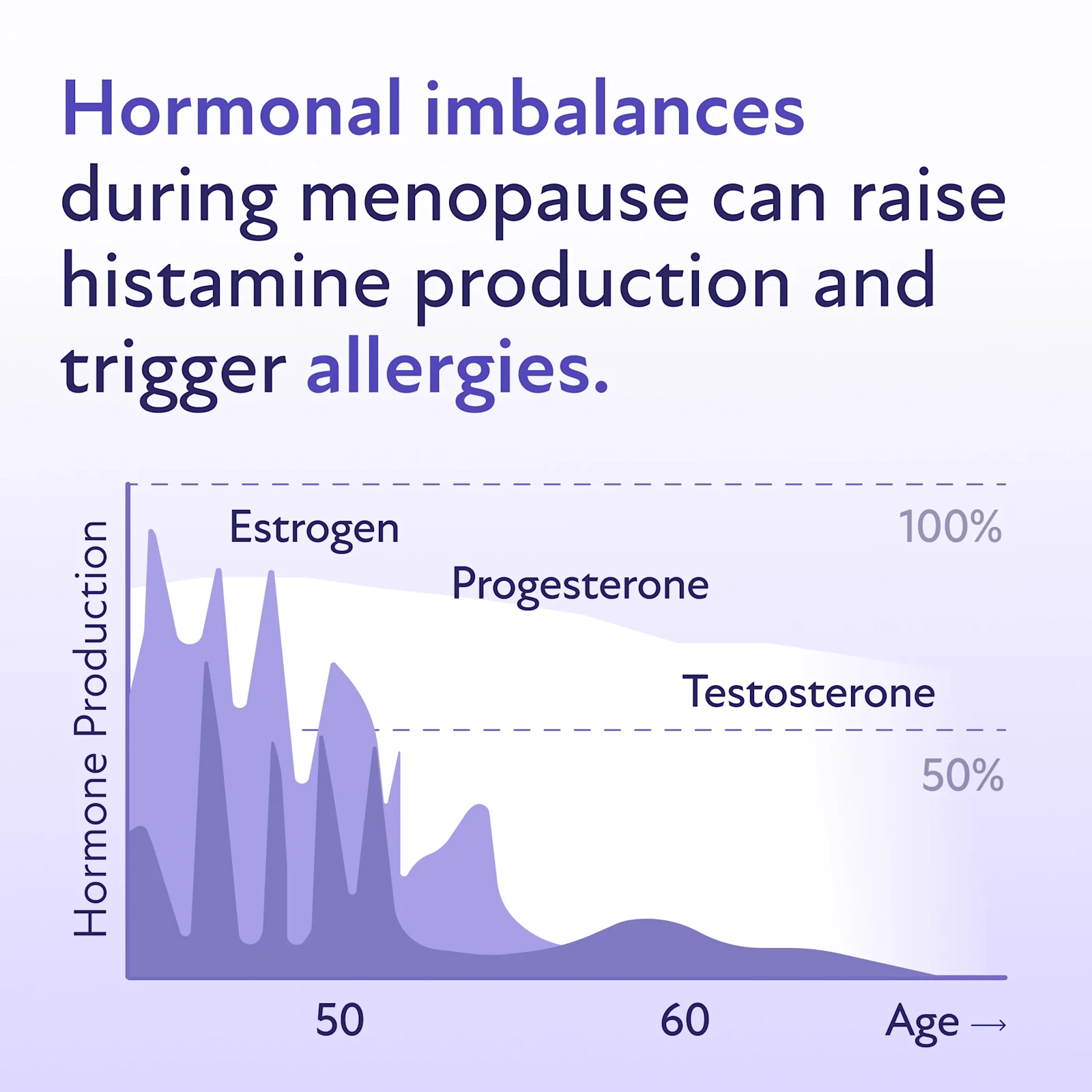Allergic conditions like asthma may peak around the onset of menopause. This finding has led researchers to believe that, although rare, allergies might be associated with menopause. While women with a history of allergies may notice worsening of their symptoms, some may experience allergies for the first time during menopause.(1)
Individuals experiencing allergies, whether or not they’re going through menopause, should consult a physician. Early allergy management improves overall quality of life and reduces the risk of allergy-related complications.
What are allergies?
Allergies are the body’s exaggerated reaction to a typically harmless substance, like pollen or peanuts. When a person with an allergy is exposed to an allergen, the body sets off a chain of reactions in the blood, which manifest as allergy symptoms, such as hives and itching.(2)
The Connection Between Menopause and Allergies
While the exact link between allergies and menopause is not clear, a combination of factors are believed to contribute, including the following:
Impact on Immune System
Estrogen receptors are present on various immune-regulating cells throughout the body. Fluctuating estrogen levels during menopause may impair the functioning of these cells and increase the risk of allergic reactions.
In addition, a balance between estrogen and progesterone is crucial for healthy immune system function. As menopause causes an imbalance in these hormones, women are more likely to experience allergies during the menopausal transition.(3)
Histamine Sensitivity
A consequence of estrogen binding to its receptors on immune-regulating cells is the release of histamine — a substance responsible for allergic reactions.
High or low estrogen levels can alter the histamine production of these cells when exposed to an allergen. This altered reaction of immune cells, when exposed to certain substances, can cause allergies.(3)
Inflammation
A 2022 study indicates that estrogen may have protective properties against inflammation. As estrogen levels decrease during menopause, the body may experience an inflammatory state, which can worsen allergies.(4)
If an individual has a history of allergic asthma, this increase in inflammation during menopause can affect the airways and worsen symptoms.(5)
Most Common Allergies Related to Menopause
Some of the most common allergies during menopause include the following:(6,7,8)
Asthma
Eczema
Urticaria (hives)
Food intolerance
Symptoms of Allergies During Menopause
Different allergic reactions during menopause can trigger a range of symptoms. For instance, eczema can result in itchy and dry skin.
Some other common symptoms of allergies during menopause may include:(2)
Sneezing
Itchy or watery eyes
Wheezing or difficulty breathing
Runny or stuffy nose
If any allergy symptoms worsen or don’t subside, it’s recommended to consult a physician who can advise on the appropriate treatment approach.

Finding Relief from Allergies During Menopause
There is no one-size-fits-all approach to managing allergies during menopause. Women can experiment with certain modifications and continue doing what works best for them, including the following:
Identifying the Triggers and Minimizing Exposure
Knowing what triggers an allergic reaction and avoiding them whenever possible can help prevent allergy symptoms during menopause. For instance, individuals allergic to pollen can limit their outdoor activities on days when pollen counts are high.
It also helps to maintain a symptom diary, which can help identify potential triggers like pet dander or pollen.
Over-the-Counter (OTC) Medications
Antihistamines are medicines that improve allergy symptoms by blocking the production of histamine. Some common OTC antihistamines include cetirizine and diphenhydramine.(9)
These medications are available as nasal sprays, eye drops, liquids, capsules, and tablets. If OTC antihistamines don’t improve symptoms, the doctor may recommend prescription antihistamines like montelukast (Singulair).
Nasal Sprays
In addition to nasal antihistamine sprays, saline or saltwater sprays can clear mucus or allergens to improve breathing. Steroid nasal sprays are also available, which can relieve symptoms by soothing inflammation in the nasal cavity.(9)
Air Purification
Experts recommend an air purifier with a HEPA filter to minimize exposure to indoor allergens like dust and pollen. Studies have shown that air purifiers with a HEPA filter could reduce the need for allergy medicines.(10)
Dietary Changes
A healthy, balanced diet can improve immune function, reduce inflammation, and help maintain a healthy weight, all of which can contribute to managing allergies during menopause.
Dietary modifications that can help relieve allergy symptoms and improve overall health include the following:(11)
Avoiding potential allergens like sulfites, which are preservatives found in foods like pickles and wine
Limiting salt intake
Avoiding processed foods like cookies, breads, and biscuits
Eating fruits, vegetables, legumes, nuts, seeds, fatty fish, milk, and eggs
Additional Tips for Managing Allergies During Menopause
Discussing Hormone Replacement Therapy (HRT) with a Doctor
Declining hormones during menopause may increase the risk of allergy symptoms, so HRT prevents this by replacing these hormones. A cohort study of 353,173 women indicated that HRT can reduce the likelihood of asthma during menopause in women with no prior history of this condition.(12)
Maintaining a Healthy Lifestyle
The following lifestyle changes may improve or prevent allergy symptoms during menopause:(13)
Managing stress through practices like meditation, yoga, and deep breathing exercises
Getting 8 hours of undisturbed sleep
Exercising regularly, including at least 30 minutes a day of moderate-intensity activities like running or swimming
Experiencing more or new allergies during menopause? Discover if HRT is right for you.
If you’ve entered the menopause transition and are struggling with allergies, you don’t have to suffer in silence. Take our brief menopause quiz to see if you’re an eligible candidate for HRT. Get started with Winona to take the first step toward feeling better.